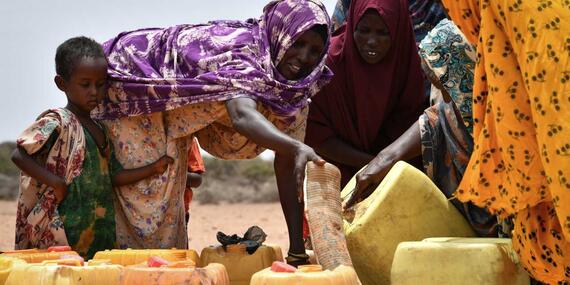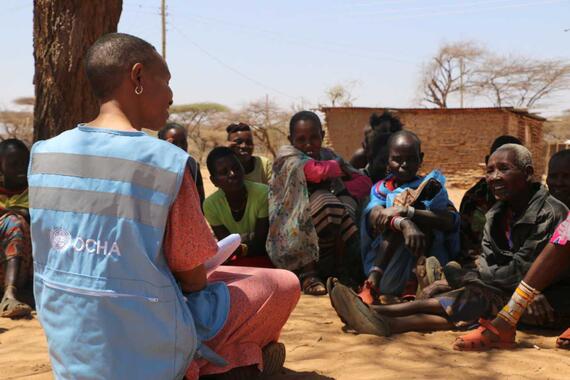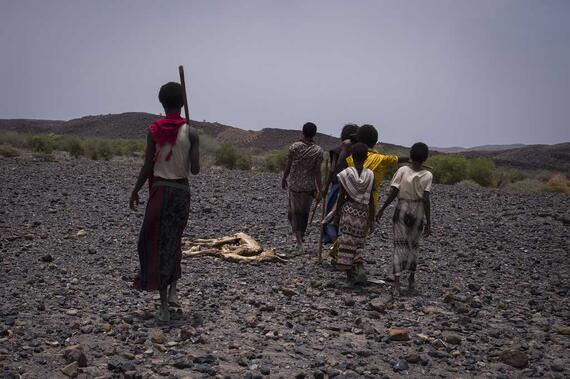COP27: Horn of Africa’s people need climate money now

Climate money needs to flow directly to fragile, vulnerable communities, including those in drought- affected Horn of Africa, said speakers yesterday (14 November) at an event organized by OCHA in Sharm El Sheikh, at the twenty-seventh meeting of the United Nations Framework Convention on Climate Change (COP27).
In the coming months, people in the region might face their sixth consecutive failed rains. But providing those people with climate money would help make them more resilient and give them more options to deal with future shocks.
“They deserve not our sympathy but our solidarity, as they endure a crisis not of their making,” said Heli Uusikyla, Deputy Director of OCHA’s Operations and Advocacy Division, in her opening remarks. “They urgently need climate financing to be unlocked to enable them to adapt to the changing climate and build their resilience for the difficult road ahead.”
The event, which put the spotlight on the impact of the region’s worst drought in 40 years was organized on the sidelines of COP27.
Andrew Harper, the Special Adviser on Climate Action to the UN High Commissioner for Refugees, asked: “How is it not a hate crime that only 4 per cent of climate adaptation money is going to Africa?”
Harper underlined that in some instances, countries such as Mozambique had adaptation plans laid out at the very local level, but they lacked resources to implement them.
Kos Musa, Project Manager for Candlelight — a Somali NGO that works in hard-to-reach areas — said she is seeing the grip of the climate crisis deepen in areas where they work.
Musa said local NGOs provide cash transfers and livelihoods support, and they even work on resilience-building projects, among other things. But more needs to be done to help people become more resilient. Musa appreciated that the OCHA-managed pooled fund for Somalia had directed 25 per cent of its funding directly to local NGOs, which has helped grassroot organizations reach the most vulnerable people in the most effective way.
Long vision
Five consecutive cycles of drought have left people in the Horn of Africa region with little time to recover, reiterated speakers at the event. Development, climate and humanitarian approaches need to work in unison to provide people with long-term solutions, as the situation is expected to worsen.

Scientist Debra Roberts, a Co-Chair with the Intergovernmental Panel on Climate Change (IPCC), said that in these contexts, “adaptation by itself is no longer enough.” The IPCC scientific community is advocating for climate-resilient development instead, she added.
Roberts also underlined the need to bring affected communities to the decision-making table.
AbdulHakim Elwaer, the Food and Agriculture Organization’s Assistant Director-General and Regional Representative for the Near East and North Africa, underlined the need for the humanitarian community to change its approach. With more failed rains looming, the situation in the Horn must be treated as a “livelihoods crisis,” he said. It requires a multipronged resilience-building approach that includes providing cash, fodder and other support for pastoral communities, supporting sustainable agriculture, resolving conflicts and helping people diversify their source of income.
Echoing a similar approach, Lt. Colonel Hared Hassan, the Chief Executive Officer of Kenya’s National Drought Management Authority, said that for an effective response, they need resources including for early warning, and for efforts to address the triggers of conflicts. He warned that if the situation is not addressed urgently, it will only “continue to worsen.”
UNICEF’s Gautam Narasimhan said humanitarian and adaptation funding should be integrated, and that it would lead to a more efficient use of money to make communities more resilient.
The World Food Programme’s Gernot Laganda said programmes to build resilience should run parallel with humanitarian assistance projects. Right now, when confronted with crises of the scale in the Horn, the funds available to the humanitarian system are being used up to provide emergency assistance, meaning there is less money at hand to build people’s resilience, which would help them recover. Laganda warned that if this approach continues, it could eventually “break the back of the international aid system.”
Acting together
The African development community is also doing its share of building people’s ability to withstand shocks.
The African Development Bank (AfDB) has invested US$1.2 billion in its 20-year Drought Resilience and Sustainable Livelihoods Programme in the Horn of Africa, said Olufunso Somorin, AfDB’s climate policy expert.

He added that AfDB is also investing an average of $2 billion every year to ensure resilience to climate change is built into every aspect of their development projects in the region.
However, in the face of shocks such as the five consecutive failed rains, Somorin said there is a realization that “we need to do big things in a short period of time [that people have to recover].” There is growing realization of the need to complement and coordinate development projects with humanitarian action, he added. Acting together will lead to solutions.
Looking ahead: COP28
Dane McQueen, Director of Programmes and Partnerships at the Office of the United Arab Emirates (UAE) Climate Envoy, appreciated the “weaving of humanitarian experience” in the often “very abstract” talks on adaptation and loss and damage at the COPs. He said COPs could be a good opportunity for political consensus and awareness-building.
With UAE as the host of COP28, McQueen flagged two ideas on which to build consensus next year. The first is to provide climate finance exclusively for fragile and conflict-affected countries, as they receive comparatively less funding than other developing countries. The funding should address long-term needs related to food insecurity, water and conflict resolution to help people overcome shocks.
The second idea is to “normalize some of the tools” that humanitarian actors use, such as anticipatory action to release resources that address shocks ahead of a predictable crisis.
